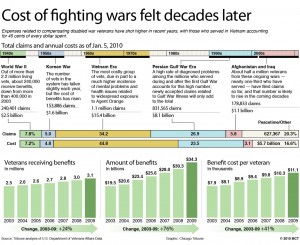 After decades of waiting, the U.S. Department of Veterans Affairs has
preliminarily cleared new guidelines for Agent Orange disabilities benefits.
After decades of waiting, the U.S. Department of Veterans Affairs has
preliminarily cleared new guidelines for Agent Orange disabilities benefits.
Agent Orange, a toxic carcinogen and herbicide, was used extensively
by the military during the 1960s and 1970s to clear jungle foliage
during the Vietnam War. As veterans of that conflict enter their 60s
and 70s, there has been a marked growth in entitlement claims related to Agent Orange exposure.
Starting this December, the new regulations, which still are subject to
a 60-day review by Congress, will include Parkinson’s and ischemic
heart disease among currently covered conditions such as prostate
cancer and diabetes.
Implementing the new guidelines could cost over $42 billion over the
next decade and increase the number of veterans currently receiving Agent Orange disabilities benefits from 349,000 to 500,000 in the same time period.
American combat personnel saw action in Vietnam as early as 1962, and by the time of the American pull out in 1975, countless tons of Agent Orange had been dumped in the Vietnamese countryside to clear jungle and vegetation from around American advance bases.
Agent Orange was the most popular of the many defoliants used throughout the course of the war. The use of Agent Orange and other defoliants that have been linked to health programs was so extensive that the Department of Defense shortly after the war ended declared that all combat personnel fighting on the ground were exposed to Agent Orange.
Given America’s involvement Vietnam and in Indochina, the issue of how American military personnel should receive compensation remains a heated issue and medical care and benefits for those who fought in the
conflict provoke debate between both veterans and politicians.
Senator Jim Webb (D-Va.) has shown opposition to the expansion of Agent Orange benefits by the Department of Veterans Affairs. In a letter sent to Veterans Affairs Secretary Eric Shinseki, Webb expressed his confusion with the reasoning behind the expanded list of conditions covered by writing, “Heart disease is a common phenomenon regardless of potential exposure to Agent Orange.”
Richard Weidman, currently legislative director for the Vietnam
Veterans of America and an Army combat medic during the war said, “The
anecdotal evidence of Vietnam veterans dying and getting diseases earlier is enormous. I know five people in the VVA leadership alone who have been diagnosed with Parkinson’s. In no other side of my life
have I seen anything like that.”
Congressional review of the new guidelines has gone forward. Senator Webb helped to convince the Senate Veterans Affairs Committee to schedule a hearing to weigh the merits of the new guidelines by the end of September.
Both sides of aisle have shown mixed support due to the rising costs of compensation claims for more than just Agent Orange exposure. In
2005 Veterans Affairs doled out $28.6 billion in claims and benefits, for the 2011 fiscal year Veterans Affairs expects to hand out over
$48.8 billion.
The numbers indicate that in six years Veterans Affairs has expanded
its share of the dole by over 71 percent. Veterans Affairs expects
that the amount of funding handed out for compensation will only grow
larger as America’s population of veterans eligible to receive benefits grows larger.
Immediately after Veterans Affairs forwarded the new set of
regulations for Congressional approval, the first in a series of funding requests by Veterans Affairs was pre-cleared. $13.6 billion
will be handed out to ensure that Veterans Affairs will have cash on
hand to cover any retroactive claims made by eligible veterans under the new Agent Orange compensation guidelines.
It is no surprise that compensation claims would be made retroactive as Americans will be going to the polls and veterans will be carefully watching any moves by either side of the aisle to slash veterans’ benefits spending.
While the Senate has begun to debate the merits of this new set of regulations, House Democrats indicate that they see this move as an opportunity to insert larger and more comprehensive benefits for Vietnam veterans.
House Veterans’ Affairs Committee Chairman Bob Filner (D-Calif.)
wishes to extend comprehensive benefits to naval personnel who fought in brown-water operations off the coast of Vietnam and along the waterways of the Mekong delta.
The issue of compensation has definitely taken on political overtones
as both Congressional Democrats and Republicans go up for election this fall. No incumbent wishes to be seen as insensitive to veterans’ claims.
In addition to expanding Agent Orange claims benefits, Veterans Affairs has also prepared to undertake a new survey of the long-term health effects of exposure to Agent Orange as well as other service related aliments for Vietnam veterans.
This new edition of the National Vietnam Veterans Longitudinal Study will be the first broad based assessment of its kind attempted since the 1980s and will work to provide data that will allow Veterans
Affairs to make new benefits and claim assessments in the future.
Vietnam Veterans Receive New Agent Orange Benefits
Mark Laluan
•
11 Views
September 23, 2010
More to Discover










